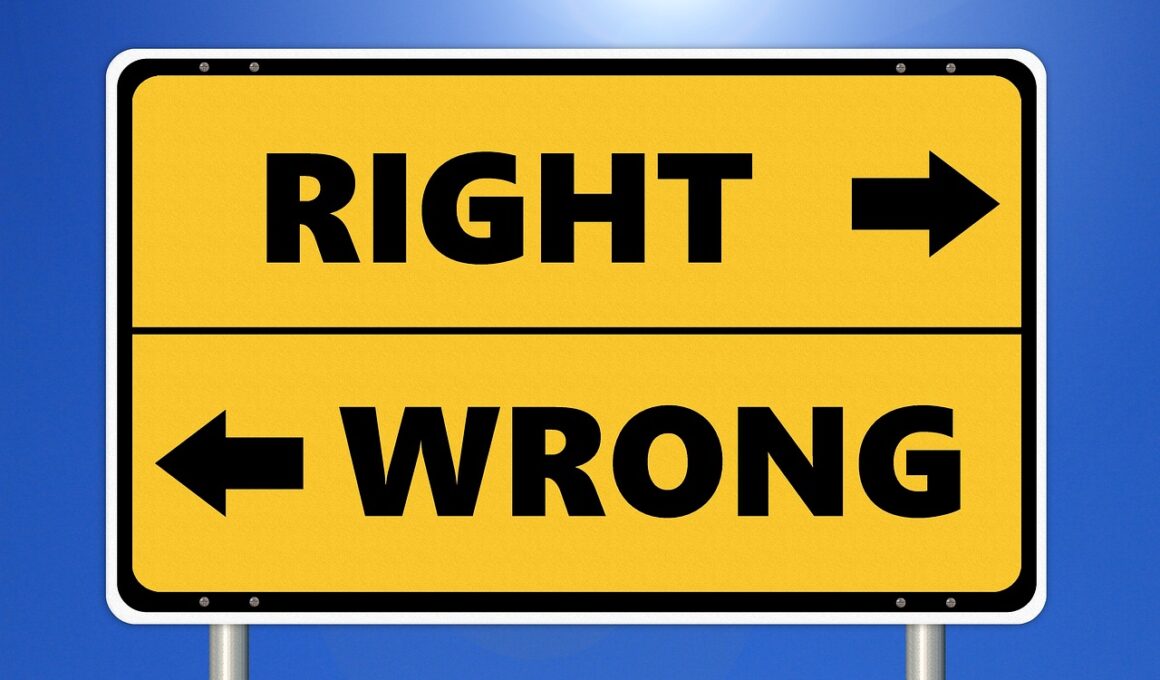Methods for Monitoring Ethical Practices in Marketing Teams
Establishing effective methods for monitoring ethical practices is vital for cohesive marketing teams. Organizations must create a structured framework that enables regular assessment of marketing strategies. This framework should focus on implementing strong ethical guidelines and ensuring that these guidelines are actively promoted among team members. Regular workshops and training sessions on ethical marketing practices can instill awareness and encourage compliance among staff members. By creating a culture of transparency, companies can empower team members to speak up about unethical practices. Setting clear expectations is crucial; this includes defining what ethical marketing looks like and highlighting the consequences of failing to meet these standards. Moreover, incorporating regular feedback sessions can significantly boost accountability within teams. Feedback mechanisms should be designed to nurture positive reinforcement for ethical behaviour and address any ethical shortcomings. Teams should encourage open dialogue, allowing members to raise concerns without fear of repercussions. Ultimately, the establishment of a comprehensive monitoring process addresses potential ethical dilemmas before they escalate, fostering a more diverse and supportive marketing environment. This proactive approach enhances public trust and strengthens brand reputation, driving long-term success in the competitive marketing landscape.
The role of leadership in fostering an ethical marketing culture is paramount. Leaders set the tone by modelling integrity and ethical behaviour in their own practices, influencing team dynamics. Recognizing the significance of alignment between the organization’s values and marketing strategies is an essential aspect of ethical marketing. Regular communication of the company’s ethical stance and commitment to transparency can enhance team morale and ensure everyone is on the same page. Furthermore, leaders should participate in ongoing training that emphasizes ethical marketing practices, ensuring that they stay informed about best practices and emerging trends. Leaders also play a crucial role in establishing clear processes for reporting unethical behaviour. As employees observe their leaders prioritizing ethical conduct, they are more likely to feel encouraged to follow suit. Additionally, promoting a reward system for ethical behaviour can strengthen dedication to these practices among marketing team members. It is essential to celebrate successes in ethical marketing and recognize individuals who embody these values. By doing so, companies can create an environment where ethical considerations are woven into the very fabric of marketing strategies, ensuring long-term sustainability and public trust.
Implementing Ethical Audits
Conducting regular ethical audits is an essential component of monitoring marketing practices. These audits provide an organized approach to evaluate marketing activities and strategies, ensuring compliance with ethical standards. Marketing teams should develop specific criteria and metrics to assess whether their campaigns align with ethical guidelines. By identifying potential areas of improvement, teams can make necessary adjustments to their strategies promptly. An ethical audit should include a review of marketing materials, advertisements, and communication strategies to ensure they convey respect, honesty, and integrity. Employing third-party auditors can provide an unbiased perspective on ethical compliance, helping identify blind spots within marketing strategies. Furthermore, involving team members in the audit process fosters accountability and encourages them to take ownership of their practices. After the audit process, teams should implement follow-up actions based on the findings. Creating a transparent report that outlines the audit results will also help motivate team members to strive for ethical excellence. Regular audits can also unveil opportunities for innovation by encouraging teams to explore new ethical marketing strategies that can cater to changing consumer expectations, enhancing overall brand loyalty.
Another valuable method for monitoring ethical practices is leveraging technology to track marketing activities. By using advanced analytics and reporting systems, teams can achieve real-time insights into the effectiveness and adherence of their marketing campaigns to ethical standards. For example, employing data tracking tools can ensure that advertisers respect consumer privacy and comply with regulations such as the GDPR. Furthermore, digital platforms can facilitate the anonymous reporting of unethical practices, allowing employees to voice their concerns about potential breaches. Incorporating comprehensive data protection agreements ensures that team members feel secure in using these platforms. Additionally, organizations can utilize performance metrics to gauge the impact of ethical marketing initiatives. Performance indicators should reflect the alignment of marketing objectives with ethical standards, allowing teams to assess their contributions effectively. Furthermore, employing sentiment analysis tools can gauge consumer reactions to marketing campaigns, identifying whether these campaigns resonate positively or negatively with audiences. Gathering feedback through surveys or social media monitoring encourages more engagement with ethical marketing practices. By embracing technology, organizations can adapt their marketing strategies while remaining accountable to their ethical obligations, thus nurturing long-term customer relationships.
Creating a Code of Ethics
A well-defined code of ethics serves as a cornerstone for empowering marketing teams to align their actions with desired values. This formal document outlines the guiding principles and standards for ethical behaviour in marketing practices. The code should encompass various elements, including honesty, fairness, respect, and social responsibility. It is crucial to involve team members in the creation of this code to ensure that everyone’s values and perspectives are reflected. Their inclusion promotes buy-in, fostering a sense of collective ownership. Once established, the code of ethics should be disseminated throughout the organization and integrated into all marketing training programs. Regular updates should also be made to adapt the code to evolving cultural and societal norms. Teams should conduct routine workshops focusing on real-life scenarios in marketing to promote understanding and adherence to the code. Providing a clear channel for reporting breaches or seeking clarification enhances the code’s effectiveness. Additionally, promoting conversations around ethical dilemmas can strengthen the team’s commitment to ethical marketing practices. A strong code of ethics combined with consistent reinforcement solidifies an ethical culture that inspires trust among consumers and stakeholders alike.
Finally, cultivating an open feedback environment significantly enhances the monitoring of ethical practices within marketing teams. Encouraging employees to voice their observations and concerns fosters transparency and responsibility among team members. Regularly scheduled feedback sessions provide a structured platform for discussing ethical dilemmas and potential issues within marketing strategies. These sessions should be designed to be safe spaces where concerns can be shared without fear of judgment or retaliation. Additionally, implementing anonymous suggestion boxes can further encourage openness, enabling employees to contribute insights into ethical practices indirectly. Furthermore, recognizing and addressing feedback promptly reinforces the company’s commitment to cultivating an ethical culture. Leaders should celebrate instances when team members successfully navigate ethical challenges, reinforcing their importance. Seamless communication channels should also be in place, facilitating dialogue among different departments and stakeholders about ethical concerns. By creating an encompassing feedback loop, organizations can strengthen collaboration and innovation in ethical marketing approaches. Ultimately, an environment that prioritizes feedback fosters continuous improvement in ethical standards, ensuring the marketing team adapts to changes in consumer expectations and industry regulations effectively.
Conclusion
In conclusion, prioritizing ethical practices within marketing teams is crucial for fostering consumer trust and enhancing brand loyalty. These practices begin with establishing clear guidelines and processes for accountability, promoting consistency across all marketing activities. Employing diverse monitoring techniques, from ethical audits to leveraging technology, ensures that teams remain aligned with organizational values. Leadership plays a significant role in modelling ethical behaviour and creating open communication channels for feedback. Additionally, a well-structured code of ethics serves as a guiding framework, while regular training sessions ensure team members stay informed about ethical considerations. Furthermore, fostering a culture that celebrates ethical behaviour encourages employees to take ownership of their actions. The methods discussed can empower marketing teams to navigate the complexities of ethical marketing successfully. As society’s expectations of businesses continue to evolve, organizations must remain agile in adapting their marketing strategies to meet these demands. This commitment to ethical practices will not only safeguard the company’s reputation but also pave the way for sustainable growth in the competitive marketing landscape. Ultimately, fostering an ethical marketing culture is not just a legal obligation; it is a moral imperative for everlasting success.
In conclusion, prioritizing ethical practices within marketing teams is crucial for fostering consumer trust and enhancing brand loyalty. These practices begin with establishing clear guidelines and processes for accountability, promoting consistency across all marketing activities. Employing diverse monitoring techniques, from ethical audits to leveraging technology, ensures that teams remain aligned with organizational values. Leadership plays a significant role in modelling ethical behaviour and creating open communication channels for feedback. Additionally, a well-structured code of ethics serves as a guiding framework, while regular training sessions ensure team members stay informed about ethical considerations. Furthermore, fostering a culture that celebrates ethical behaviour encourages employees to take ownership of their actions. The methods discussed can empower marketing teams to navigate the complexities of ethical marketing successfully. As society’s expectations of businesses continue to evolve, organizations must remain agile in adapting their marketing strategies to meet these demands. This commitment to ethical practices will not only safeguard the company’s reputation but also pave the way for sustainable growth in the competitive marketing landscape. Ultimately, fostering an ethical marketing culture is not just a legal obligation; it is a moral imperative for everlasting success.


